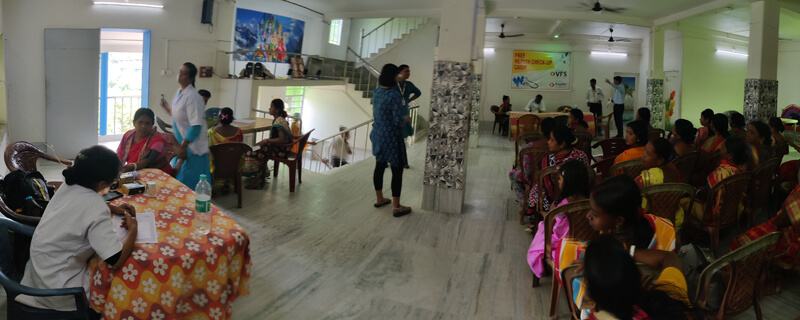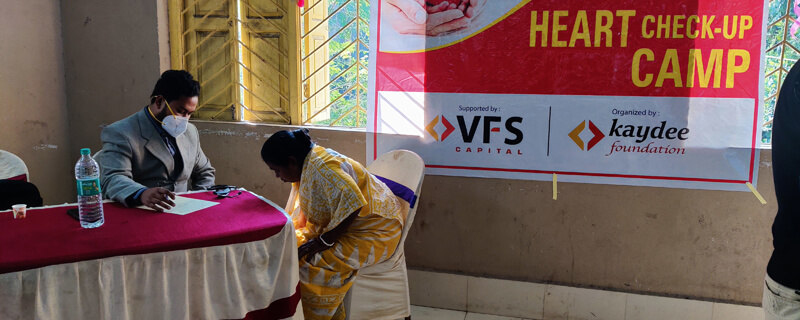Kaydee Foundation is dedicated to providing accessible healthcare to local communities in India. Through camps and Mobile Medical Units, the foundation offers free medical services to improve overall health and promote awareness about healthcare. In order to address healthcare gaps in remote areas, the Mobile Medical Unit is deployed to provide essential medical services. Additionally, the foundation focuses on menstrual hygiene for underprivileged women by offering affordable sanitary napkins to prevent health complications. This program not only has a direct impact on women’s health but also has broader socio-economic implications. By recruiting rural youth to conduct menstrual hygiene drives, the foundation not only spreads awareness but also provides a means of livelihood. These workshops are instrumental in breaking the stigma and superstition surrounding menstruation, while also educating women about proper hygiene practices.

The Mobile Medical Unit (MMU), managed by the Kaydee Foundation, is an initiative that addresses the critical gap in healthcare access for people in remote areas where the availability of traditional healthcare facilities is limited due to geographical, economic, or social barriers.
The operation of MMU, specially designed vehicles equipped with modern medical amenities, along with a dedicated team of qualified medical professionals, allows the delivery of comprehensive free healthcare services directly to underserved communities. This project ensures that individuals receive essential medical attention such as preventive care, screenings…

Kaydee Foundation addresses a critical need for accessible healthcare through camps to provide essential medical services with the highest standards to local communities focusing on reaching out to various states in India. The foundation offers free medical services to those who cannot afford it to improve the health and well-being of individuals and contributes to raising awareness about the significance of healthcare within the local population. The commitments of the Foundation are based on its objectives

Kaydee Foundation’s collaboration with partner organizations to organize the General Health Camps is a commitment to community welfare and accessible healthcare to underprivileged people. These initiatives address immediate health needs and also empower individuals to take control of their health in the long run.

Kaydee Foundation’s initiative to provide specialized free Heart Check-up Camps in rural areas is an effort to improve access to medical care and promote health awareness among underserved populations. These camps offer essential medical assessments and equally aim to educate individuals about preventive measures and lifestyle changes. Key features of the initiative include…

The Kaydee Foundation’s dedication to provide specialized gynaecological care to rural women in remote areas focuses on the significant healthcare gap by setting up organized camps with highly experienced gynaecologists, the Foundation is able to assess and address the unique feminine health issues suffered by these women. This approach ensures that women who face challenges accessing quality healthcare are able to receive the critical healthcare needs and the guidance they deserve. The assessment, diagnosis, and treatment options offered by the medical team are making significant impacts on the overall health and welfare of the women in these communities.

The Kaydee Foundation addresses a critical need in underserved communities by focusing on enhancing healthcare accessibility, including vision health. Our free eye camps in various locations initiate an impactful way to bring much-needed care to those who may not have easy access to essential eye health services. A few aspects that highlight the importance and impact of the Kaydee Foundation’s work are:

Kaydee Foundation addresses the crucial aspect of menstrual hygiene to create a positive effect on the health, well-being, and qualitative life of underprivileged women in underserved areas. The Foundation addresses the financial barrier that many rural women face in accessing proper menstrual hygiene products by offering good-quality affordable sanitary napkins to prevent the risk of infections and health complications from unhygienic practices.
Furthermore, this program has broader socio-economic implications, as the recruitment of rural youth to conduct the menstrual hygiene drives is a creative and practical solution to spread awareness and provide a livelihood. These workshops play a crucial part in breaking the stigma and superstition around menstruation and educating women about proper hygiene practices.